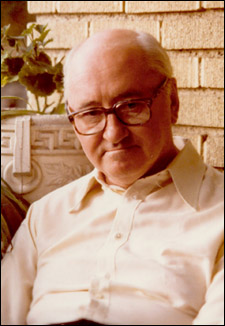‘Towering figure’ in Latin literature Bailey dies at 87
Harvard’s Pope Professor edited, authored some 50 volumes

David Roy Shackleton Bailey, Pope Professor of Latin Language and Literature Emeritus at Harvard University, died at 9:45 a.m. on Nov. 28, at the age of 87. Since his retirement from Harvard in 1988 he had been a resident of Ann Arbor, Mich., where he had taught and continued to write as an adjunct professor in the Department of Classical Studies at the University of Michigan.
Shackleton Bailey, or “Shack” as he was known to friends, was a prodigious scholar, a towering figure in textual criticism and the editing of Latin literature, and a brilliant student of Roman Republican history, prosopography, and society. To say that his chief contribution was in the editing of a whole range of Latin texts only begins to describe the enduring importance of his work, which continued through the summer of 2005, and amounts to some 50 volumes and more than 200 articles and reviews.
Along with A.E. Housman, whose last lecture he is, fictitiously but significantly held to have attended, Shackleton Bailey is recognized as one of the 20th century’s great scholars of Latin textual criticism, the challenging discipline and art of restoring and explicating texts that survive in papyri, codices, and printed editions, in varied states of corruption and error from classical antiquity to the present day. Expertise in this sort of scholarship comes only through a deep immersion in the literary, historical, and social traditions in which the Latin language evolved. Behind the simple reality that he edited, emended, translated, and commented on a variety of authors, in prose and poetry, across several centuries, there is implied a profound industriousness, intelligence, learning, and culture that is unlikely to be seen again.
Shackleton Bailey’s name is most closely associated with that of Cicero (106-43 B.C.), whose letters in their entirety and speeches selectively he edited, with translation and commentary (the letters in 10 magisterial volumes). Scholars, students, and (through Penguin and Loeb Classical Library translations) that evanescent figure, the general educated reader, will continue to be indebted to Shackleton Bailey, particularly for his work on Cicero’s letters, our best evidence for the twilight years of the Roman Republic. Cicero’s correspondence, very little of which was ever intended for the public eye, reveals much about the most important orator and, in many ways, the most important thinker of the Roman world, and as Achilles was fortunate to find his poet in Homer, so Cicero is lucky to have found his scholar in Shackleton Bailey. Cicero’s letters bristle with literary and other jokes; with oblique references to persons, sometimes unnamed, for whom we have no other evidence; with allusions to political happenings of central importance, again known primarily or only from the letter in question. Brilliant at representing the idiom of this complex Roman statesman, poet, orator, philosopher, and theorist of rhetoric, Shackleton Bailey revealed the depth of his scholarly control of all aspects of Latin and of late Republican Rome, and so gave us in modern English with the perquisite commentary a Cicero who never meant us to read his correspondence, but who is infinitely more complex, sympathetic and, ultimately, more human for our being able to do so.
Born in England on Dec. 10, 1917, Shackleton Bailey attended the Lancaster Royal Grammar School, where his father, a mathematician, was headmaster, after which he read Classics at Gonville and Caius College, Cambridge, taking a B.A. in Classics. Wartime work in Intelligence at Bletchley Park, Bedfordshire, was followed by an appointment for 20 years as Cambridge University Reader in Ancient Tibetan. He returned to the Classics as Fellow of Jesus College, Cambridge, and later of Gonville and Caius College, where he also served as college bursar. In 1967 he moved to Ann Arbor, where he taught in the Department of Classics until 1975, when he became a professor of Latin at Harvard. He was a doctor of literature of Cambridge University and (honorary) of The University of Dublin, a Fellow of the British Academy, a member of the American Philosophical Society, an honorary member of the Society for the Promotion of Roman Studies, and also one of the very few living holders of the British Academy’s Kenyon Medal for Classical Studies. He married Hilary Amis in 1967, and he is survived by his second wife, Kristine Zvirbulis, whom he married in 1994.
All of this only begins to capture the enduring scholarly output of Shackleton Bailey, a body of work that assures him an enduring place in a field that flourishes in the face of regular predictions of its demise. But the sum of the man is much more than the memory of all whose lives he touched. An eccentric figure by conventional standards – his regular attire was a gray suit and sneakers long before the latter became part of the academic’s uniform – but mainly in the true and joyous sense of the word: quirky, difficult, cultured in profound and complex ways; endowed with a rare and keen sense of humor now cutting, now playful; a critic of human foibles and a man whose dedication to logic, reason, judgment, and the primacy of intelligence made those in his presence careful of their thoughts and words. His scholarly magnitude led many to mistake an intense shyness for hostility or dismissal, those too not absent where he felt they were deserved. He was a great lover of cats, but not all cats; here, as everywhere, he applied judgment, as he believed did the cats who particularly took to him. In a field in which a certain amount of eccentricity is, if not the norm, at least unsurprising, Shackleton Bailey was a legend in his own time, and will not be soon forgotten.
Contributions may be sent to the World Wildlife Fund, 1250 24th St., N.W., P.O. Box 97180 Washington, D.C. 20090-7180 or go to https://secure.worldwildlife.org/forms/mail_form_join.cfm.
Richard F. Thomas is chair of the Department of the Classics




